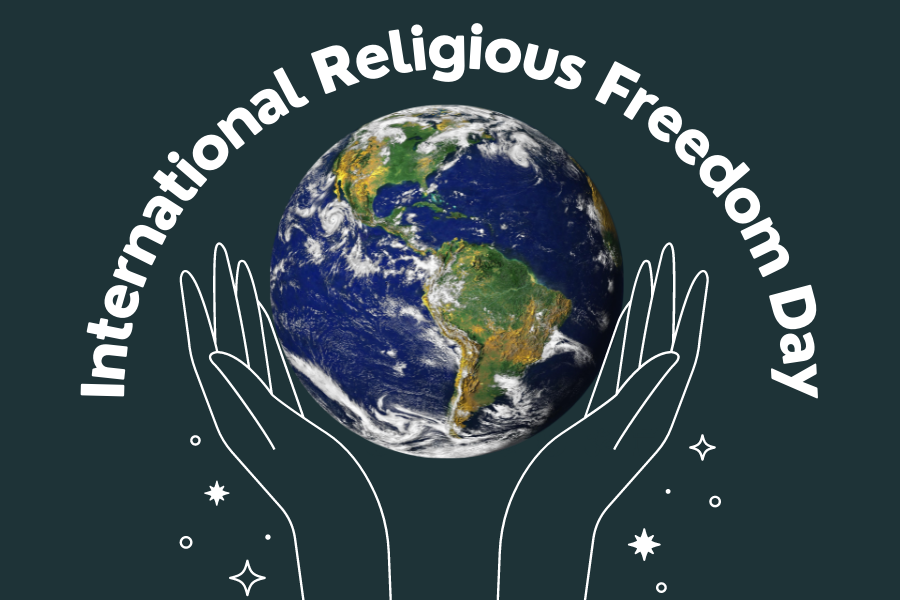*Editor’s Note: The “Views from NAU” blog series highlights the thoughts of different people affiliated with NAU, including faculty members sharing opinions or research in their areas of expertise. The views expressed reflect the authors’ own personal perspectives.
 By Björn Krondorfer
By Björn Krondorfer
Regents’ professor in the Department of Comparative Cultural Studies and director of the Martin-Springer Institute
One of the lesser-known occasions set aside to celebrate the importance of civic virtues is the International Religious Freedom Day on Oct. 27. Religious freedom, a constitutional right in the United States, is an idea often invoked though also frequently misunderstood.
On first impulse, the concept seems to refer only to the protection of religious practice and beliefs of individuals and communities; that is, protection from state or government interference in the free exercise of one’s religious convictions. Whatever country you may live in around the globe, you shall not be forced to abandon your religion or adopt religious beliefs and practices not your own. The official site of the U.S. Department of State regarding International Religious Freedom Day focuses on this part of religious freedom: to acknowledge it as a “cherished American value and universal human right” and describing it as an occasion “to advocate for the rights of vulnerable and underrepresented people around the world, [and] to promote and protect freedom of religion or belief for all.”
To protect the free exercise of religion from control by those in power is indeed an important human right. The long and brutal history of confessional wars in Europe (mostly within Christianity between Catholics and Protestants) led many European communities to leave and settle in North America. This experience helps to explain the motivation to enshrine religious freedom in the 1791 Bill of Rights in the United States—notwithstanding the fact that these rights were not extended to the Indigenous populations during the westward expansion of Europeans on this continent. The latter point is important to keep in mind at Northern Arizona University, which sits on traditional homelands sacred to Native Americans.
The protection of religious minorities in today’s world is as urgent as ever. We can name here the Rohingya Muslim minority in the Buddhist-controlled, nationalist state of Myanmar exposed to genocidal violence and forced expulsion, or the Shia Muslim minority of the Hazara in Afghanistan under massive attack by the Sunni-led ISKP (Islamic State of Khorasan Province) and ISIS. We can call attention to Serbian Orthodox and Croatian Catholic nationalists fighting each other in a brutal war in the 1990s, and both suppressing the Muslim population in Bosnia and Herzegovina. We can also mention the Chinese government suppression of Tibetan Buddhism, the ongoing tensions in Northern Ireland between Catholics and Protestants or Russian President Vladimir Putin pressuring the Russian Orthodox Church hierarchy to propagate hatred against fellow Ukrainian Orthodox believers. These are just a few examples of persecutions of religiously identifiable populations, though ethnic hatreds and political interests have always intersected with religious differences in these conflict zones, past and present.
However, there is another dimension of religious freedom that is often sidelined by those who feel that it is only their religion that does not get its fair share in the public arena. “Religious freedom” is not only freedom of religion but also freedom from religion. That is to say, a country shall not be ruled by one particular religion, and citizens shall not be coerced into participating in a state-sponsored religion. The First Amendment of the U.S. Bill of Rights clearly states, “Congress shall make no law respecting an establishment of religion, or prohibiting the free exercise thereof.” These two provisions are commonly referred to as the Establishment Clause (which prohibits a government from “establishing” one religion) and the Free Exercise Clause (which protects the rights of citizens to practice freely their religion within broad parameters of what is publicly acceptable). To understand the complexity between these two clauses, consult for example the American Bar Association or this educational resource from U.S. Courts.
Freedom from religion is as important a human rights issue as freedom of religion. If the former is ignored, it leads to a state religion or nationalist religious rule that ignores the rights of both non-religious citizens and religious minorities. Frequently, the loudest voices demanding freedom of religion are the first to deny the right of freedom from religion, because they advocate for ruling a country in accordance to a particular understanding of a divine will. In the worst-case scenario, this can lead to overturning democracy (rule by the will of people) to establishing a theocracy (rule by the assumed will of God). Theocracy is a form of government in which a deity or God is recognized as the supreme civil ruler, implemented by earthly religious leaders (which, historically, has always turned out to be some variation of an autocratic or totalitarian rule).
There are many examples of such unholy alliances between religious elites with nationalist movements and nation-states. We could name the Iranian Shia theocracy, but also the current national Catholic government in Poland. Or point to the embrace of conservative Christian values by the current Hungarian Prime Minister Victor Orban to cement his authoritarian rule and the current government in India, which embraces the religious-political values of Hindutva, a form of Hindu nationalism that curtails the rights of its circa 200 million strong Indian-Muslim minority. Unfortunately, the United States is not immune to these trends either, with a growing movement described as Christian nationalism that seeks to impose Christian beliefs and norms on all Americans. For a U.S.-based organization advocating for a stronger church/state separation, see for example Americans United For Separation of Church & State.
In sum: On Oct.27, let us pause for a moment and reflect on the volatile, complex and multidimensional issues regarding religious freedom—internationally and domestically.




 By Björn Krondorfer
By Björn Krondorfer